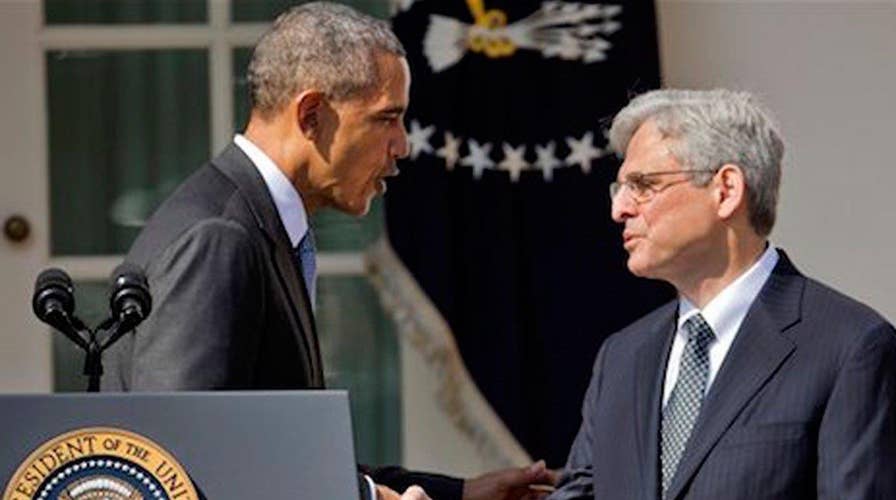Obama makes his case that Garland deserves a chance
The president attempted to shame Senate Republicans into giving the Supreme Court nominee an up or down vote; Kevin Corke reports on 'Special Report'
A last-ditch effort for President Obama to try and punch Merrick Garland through to the Supreme Court to replace the late Justice Antonin Scalia is unlikely.
A new Congress starts at noon Tuesday and there’s no active chatter that the Obama administration has anything in the works or is even contemplating a bizarre, extra-Constitutional power play. If nothing else, the concept is gaining attention in various legal, parliamentary and journalistic salons.
There will be a five minute window between when the 114th Congress adjourns and when the 115th Congress convenes. This little window of opportunity could give Obama the unprecedented opportunity to make an “intersession recess appointment,” bypass the traditional confirmation process and install Garland on the Supreme Court.
In 2014, the High Court ruled that the executive branch of government can’t tell the legislative branch of government what it believes constitutes a “Congressional recess.” However, it’s clear that Congress is out of session between the 114th and 115th Congresses.
President Teddy Roosevelt seized the short period between the two Congresses to make 168 appointments to various executive branch and judicial posts – widely viewed as a remarkable power grab.
The possibility of a Roosevelt-esque power play would be seen as foolish from a strategic standpoint, according to one Senate GOP leadership aide.
"They would trade a short-term on SCOTUS, for a full-time, lifetime tenured seat on the DC Circuit. And that's assuming that SCOTUS would let it stand,” the aide told Fox News.
That’s a reference to the fact that recess appointments only last for a short period. Whereas, Garland is currently serving on arguably the most important court, save for the Supreme Court. And it is a lifetime opportunity – unless Garland were to give it up for a chance on the higher court for a couple years. In other words, as a “recess appointment,” Garland would have to face Senate confirmation at some point.
Also, incoming Senate Minority Leader Chuck Schumer, D-NY, is a dealmaker. He has to work with the GOP majority. Schumer must also protect vulnerable Senate Democrats facing tough reelections this year. If the Democrats pull the Garland trick, Senate Majority Leader Mitch McConnell would shut off the tap to the Democrats.
A stunt like this with Garland would be the “thermonuclear option.”
Additionally, a move like this is something that no one on Capitol Hill is talking about. It’s just not a topic of conversation. For their part, Senate Democrats are busy girding for heating confirmation battles as President-elect Trump prepares to take office.
As for the legal ramifications, while there are experts who say such an "intersession" recess appointment could be legal, it's still quite arguable.
Look back at the 2014 Supreme Court decision on recess appointments.
The High Court struck down a series of Obama appointments to the National Labor Relations Board (NLRB). It was a victory for the Senate GOP which brought the case.
As a result, the Republican-run Senate has been very careful to hold "pro-forma" sessions every few days (where the Senate literally gavels in and gavels out after 20 to 30 seconds) to leave no gap under which a recess appointment could be valid. The NLRB case indicated that only if the Senate were gone for more than ten days could an administration consider the Senate as being "on recess." Thus, only then would a "recess appointment" be in order.
That said, the Supreme Court's NLRB decision left a murky area when it comes to the brief period in between sessions of Congress. Regardless, the appointment would be challenged and tied up in the courts.
Fox News’ Chad Pergram and Kara Rowland contributed to this report.





